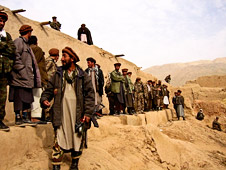
I arrived in Afghanistan during the bombing in November, 2001 and saw the sharp blades of the mountains of the Kvajeh Mohammad range rising over the bright green filaments of the river valleys. At night, the stars burned in a field of cold glass and the air smelled of wood smoke. Later, a starving man in a ruined house offered his only bread because this is how guests are treated. In Afghanistan, there was always the decency of people who owned nothing but their will to live and a few tools for farming. It is necessary to remember this when speaking about Afghans and their country, a place where the West is rendered insignificant under the crushing weight of all that time. Buddhist, Persian and Greek travelers moved across these valleys over thousands of years carrying their books and this makes Afghanistan the greatest road story of all time. The Pamirs and the Hindu Kush ranges hold the ghosts of these civilizations and their monuments like branches caught in the eddy of a river. When I came back home at the end of November, 2001, I could only think about returning and nothing else.
My work in Afghanistan took place over three trips, the first during the battles where Taliban forces retreated from the north and ultimately lost control of the country. The next was a strange ride across the craggy spine of the country from Jalalabad to Kandahar before the road was completed where we fishtailed our way through rivers of dust directly into the path of Hazara bandit children. The third was a difficult trip which took me to Kunar province just as the local people started to turn against U.S. forces. These were some of the earliest stories I've written, long before we were distracted by another war in a much different place.
In a market in Jalalabad, in 2002, I saw blacksmiths making satellite dishes out of sheet metal using only hammers. Farmers near Kunduz spread their rice crop out on the road so the wheels of passing cars would clean it. Everywhere you saw the intelligence and resilience of an unconquered people and this made it impossible not to feel hope for the country, because after decades of war they had not been destroyed.![]()
 LEAD IMAGE: 25 November, 2001, Taloqan, Afghanistan. Northern Alliance fighters in a shura to discuss the advance of forces to Kunduz.
LEAD IMAGE: 25 November, 2001, Taloqan, Afghanistan. Northern Alliance fighters in a shura to discuss the advance of forces to Kunduz.Photo: Phillip Robertson
© Phillip Robertson, 2009-2020.
